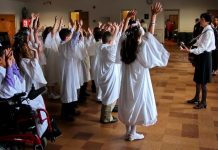
by Rev. James Schimelpfening, SM
For a more comprehensive Study Guide and Related Readings, see the end of this article.
“When you hold a sacred text in your hands, and ponder its wisdom, it is not enough to learn the meaning of the words alone. A sacred text is like the flame of a candle. You can observe its color and height; you can describe its many properties. You can smell its fragrance, watch the way the flame constantly flickers in the air. You can measure the intensity of its heat and light, and calculate how rapidly the candle will burn. But that is not enough to know it. It is not until you have touched your finger to the flame that you can know the real meaning of the candle. This is how it is with sacred texts.”1
Becoming a beatitudenal person and learning to live a beatitudenal life means that we must reach out and “touch the flame” of the Sermon on the Mount—for intellectual understanding alone will not suffice. Touching the flame, however, means being burnt by the Word of God and undergoing a change, a shift of consciousness that re-patterns both our inner and outer worlds.
When we examine the Gospels, we see that Jesus repeatedly turns things upside down and leaves people amazed, stunned, enlightened, confused, and sometimes quite angry and upset. To say, for example, blessed are the poor in spirit, blessed are those who mourn, blessed are the meek, and so forth can bring great joy but it can also be quite disturbing. Jesus sees and names as blessed what many in our culture and ego-driven world would consider completely counterintuitive, lacking in logic and commonsense, and downright ludicrous.
How do we, as Jesus’ disciples, come to see, value, think, and act as Jesus did? How do we come to live the Beatitudes and not just know them intellectually?
A Discerning and Attentive Heart
Like nearly everything in our lives as disciples of Jesus, we must learn the art and discipline of spiritual discernment if we hope to live Christ-like lives. The word discernment is fairly common in our usage today and generally refers to decision making. Discernment, however, is much more than decision making; it is about developing a discerning heart, a heart that strives to know—as much as anyone could ever know—the mind, heart, and ways of God.
The word discernment finds its roots in the Latin word discernere and the Greek word diakrisis, both of which mean “to separate out, to distinguish, or to sift.” We sift or sort out the good from the bad, the inner from the outer, the true from the false, the light from the dark, and even the good from the better, and so forth. Grounded in prayer, discernment is not limited to decision making but, instead, is a daily spiritual practice by which we come to know more fully what is of God and what is not, what leads to living a life more fully in and for God and the Kingdom of God. By living a discerning, reflective life, we come to learn how to live for the greater glory of God.
First and Foremost
A key element in the process of discernment involves being in touch with our desires—and not just any desire but those most intimate desires that often are vocational in nature, penetrating the truth of our being, of who we are as persons.
Good desires are expressions of our true selves, akin to a north star, which can help guide us in the right direction. Desires are bursting with energy and passion, moving us to act, decide, choose, and judge. So in discerning, we ask ourselves: Who or what do I really long for? In the gut of my being, deep in my heart and soul, who do I, if truth be told, yearn to be and what do I crave to do? What do I sincerely desire to strive for and invest energy in? What is the ultimate gift I want to offer God and the world? Do I desire to live a beatitudenal life and be blessed in the ways that Jesus names a beatitudenal life?
Without a doubt, these are not easy questions to answer. Over the course of our lives, our responses may vary, at least with nuance or degrees of clarity. But the questions and our answers are important because they place us on a path that will lead us to becoming, with the grace of God, what we desire. We will move toward God through what we desire and love.
Deep Listening
Being in touch with our deepest desires as well as the process of discernment as a whole calls for deep listening. Deep listening means that we attend with mind and heart. We listen to the word of God in Scripture, to the voices of the holy men and women present in our rich and ancient Christian tradition. We listen to the Holy Spirit speaking through today’s prophets and in the events of daily life.
Also, and in some ways most especially, we listen to the voice within that at times is almost like a gentle whisper. We aspire to develop the habit of this form of listening in an attempt to walk with God in all events, times, and places. Through ongoing discernment, we come to the point when we can say, as did St. Paul: “I live, no longer I, but Christ lives in me.”2
As we listen, we will hear the call of God to seek something more—not just any kind of “more,” but the more of God and what is of God. In our deep desires to be disciples of Jesus, we will want to understand better what that might mean for us, tangibly. We will want to belong to God more faithfully and be increasingly steadfast in our commitment to God’s reign. There will be within us an internal imperative to understand how this can be so in our lives, how our hearts and souls must change for the re-patterning of our inner and outer worlds to come about.
We will be looking for the ways to live on the outside what we are most authentically within! In his book Let Your Life Speak, Parker Palmer quotes the poet Rumi: “If you are here unfaithfully with us, you’re causing terrible damage.”3 Becoming a beatitudenal person is an act of faithfulness and a blessing for others as well.
Growth in Freedom
The Sermon on the Mount, within which we find the Beatitudes, is considered to be a fundamental, essential teaching of Jesus. Here is where the proverbial “rubber hits the road” in discipleship. This is where we must choose to reach out and touch the flame and not just contemplate it.
As we move deeper into this radical life of discipleship, we will experience many different emotions and contradictory thoughts. Likewise, as we set out to become beatitudenal persons, we will discover within ourselves areas of resistance. Some of the Beatitudes might be easy to relate to and embrace. Others will be more difficult for us to identify with and will reveal some degree of resistance that points to areas of needed reflection and growth—and possibly profound and fundamental conversion as well.
Resistance, in my experience, often points to something that is not free—thus the “push-back.” Perhaps there are attachments that must be relinquished because they hold us bound, impeding us from saying yes more fully. So what are we to do? How will we know how to proceed? Again, this is where more, ongoing discernment is vital.
As we do the sifting and sorting work of discernment, we grow in self-awareness, which in turn can lead to greater freedom, true freedom in God. We strive to be free from anything that impedes us from living a beatitudenal life. “Freedom from” makes possible “freedom for”—freedom to love.
Ultimately, discernment and freedom are about love—love of God and love of others. Like the rich young man in the Gospel, we sometimes walk away sad, for the invitation of Jesus calls us to relinquish what we have become attached to.4 As we grow in freedom, we grow in love and, as we grow in love, we grow in freedom.
Father Pedro Arrupe, former Superior General of the Jesuits, grew in this love and freedom through his own life of habitual discernment. Toward the end of his life he wrote: “Nothing is more practical than finding God, that is, falling in love in a quite absolute final way. What you are in love with, what seizes your imagination, will affect everything. It will decide what will get you out of bed in the morning, what you will do with your evenings, how you will spend your weekends, what you will read, who you know, what breaks your heart, what amazes you with joy and gratitude. Fall in love, stay in love, and it will decide everything.”5
Examen of Consciousness: A Practical Tool
A helpful tool for ongoing discernment and growing in the beatitudenal life can be found in what is referred to as the “examen of consciousness.” This examen, often confused with “examination of conscience” by those who first hear of it, is quite different; it does not primarily seek to know our sins in order, for example, to prepare for the celebration of the Sacrament of Reconciliation. Rather, this examen seeks to help us become increasingly aware of the spirits that move within us—of the diverse inclinations that are present in our hearts and minds. Thus, by the process of sifting, sorting, and discriminating, we begin to recognize what is of God, the Source of all that is good, and what is not.
The habitual practice of the examen leads to gratitude and joy. And yes, the process also points out areas that are in need of growth or repentance. The primary concern of the examen is the deep reflection that helps us see how we can cooperate more fully with the movement of the Holy Spirit within us in order to move toward greater trust, love, and faith. As a result, we are more able to say yes to whatever God asks of us or invites us into. As we practice the examen, we soon learn the truth of the statement of the disciples of Emmaus who reflected on their encounter with Christ: “Were not our hearts burning within us when he spoke to us along the way?”6
Examen: Basic Components
This examen of consciousness, which leads to transformed consciousness and more authentic Christian living, has some basic components. Before presenting these elements (my adaptation of what I have found in various Jesuit resources), let me note that the daily practice of this examen is advisable, and that sufficient time be dedicated to it if we would like this spiritual discipline to bear fruit.
* Begin by entering into quiet, recalling the presence of God and calling upon the guidance of the Holy Spirit.
* Look over the day, noticing the ways in which God was at work. Name the ways you rejoiced and gave thanks.
* Look also for the moments and situations in which you failed to cooperate with the grace of God, when you preferred darkness to light, turned your back on God, gave in to pressure. (Here we also take note of moments of resistance.) Where there is sin, express sorrow. Where there is resistance, ponder its significance.
* Discern what might be needed for tomorrow (if your examen is at the end of your day) or what you need as this day continues to unfold. What grace do you ask of God? What might you need to surrender or change in order to cooperate more fully with God?
* Ask God’s blessing and give thanks.
This examen can be a helpful tool in our efforts to live beatitudenal lives. For example, by practicing this examen, we can come to understand what it means to be, as the first Beatitude says, poor in spirit, and how we can daily grow in becoming poor. We can begin to recognize, experientially, how blessed are the poor in spirit for, truly, theirs is the Kingdom of Heaven.
Conclusion
There is so much more that can be said about discernment and living a beatitudenal life, but the bottom line is found in a comment of the second-century bishop St. Irenaeus who noted that the glory of God is the human person fully alive.
Endnotes
1. Barbara E. Bowe. Biblical Foundations of Spirituality: Touching a Finger to the Flame. New York: Sheed & Ward, 2003 (p. 2).
2. Galatians 2:20.
3. Parker J. Palmer. Let Your Life Speak: Listening for the Voice of Vocation. San Francisco: Jossey-Bass, 2000 (p. 31).
4. Matthew 19:16-22.
5. clc-usa.org/clc_PryrServ.htm
6. Luke 24:32.
Father Jim, a Marianist priest, is in ministry at the University of Dayton where he serves as priest and spiritual director through the Office of Campus Ministry. He teaches a graduate religious studies course in Spiritual Direction and Pastoral Care and leads a graduate seminar in Theological Reflection. Over the years, he has preached numerous retreats and parish missions, and has been on team for directed tetreats. As a Marianist, he has lived and ministered in a variety of different settings in Latin America, India, Europe, and North America.
Study Guide and Related Readings
A Beatitude life calls for the ability to apply principles of discernment for reading the signs of the times. The Spiritual Exercises of St. Ignatius Loyola have been the guiding light for centuries. Learning how to navigate through the perils of cultural distractions is not an easy task in modern times.
In this article, Fr. Schimelpfening offers a few basic tips for practicing or exercising the skills of discernment. The principles and skills guide us up the ladder of the Beatitudes. He points out that the word discernment comes from the Latin word discernere and the Greek word diakrisis, both meaning to separate out, to distinguish, or to sift. By living a discerning, reflective life, we come to learn how to live for the greater glory of God and to grow toward holiness.
Discussion/Reflection Questions
1. How do I engage in discernment? What method or process have I applied to date? How has it helped me toward making the right decision toward a healthy and holy life?
2. What does Fr. Schimelpfening mean by “touching the flame” of the Sermon on the Mount? How does it apply to me?
3. What do I most desire? How are my desires influencing the decisions I make that enhance or inhibit my ultimate life goals or purpose?
4. What is the meaning of “deep listening”? When have I engaged in deep listening? How would I describe the process for developing this skill in one’s life?
5. Have I ever experienced the kind of resistance with God that is addressed in this article? What were the outcomes?
6. How do I experience that God is absolutely in love with me? With those I like and dislike? What difference does this make in my life?
7. How do I exercise a daily or weekly examination of conscience? What practices are most helpful to me?
8. How can I nurture within my students the skills for quality discernment? What approach may I take? Or what do I need to learn in order to guide my students?
9. How can my reflection on this article support preparing my students for a richer experience of the Sacrament of Penance?
10. What has been the most significant insight or idea I have gleaned from reading and reflecting on this article for enriching my understanding and living the Beatitudes?
Exercises
1. Research different methodologies for practicing discernment. Adapt and share these practices with your students. Or read and reflect on one of the many books on Ignatian Spirituality and apply the method in your life.
2. Explain how discernment was practiced in the lives of the saints or great Church heroes. Engage students in a Catholic Hero’s Hunt and prepare a class multimedia (PowerPoint) or oral presentation. Or have students engage in a meeting of Great Catholic Heroes, discussing their lives and how discernment played an important role. It was never easy, but the ultimate goal of fidelity was realized.
3. In Westernized cultures, people tend to listen to others from the standpoint of their own personal interests rather than from those of the whole group. Practice deep listening with your students. In their book titled Dialogue at Work, Glenna Gerard and Linda Ellinor offer excellent ideas that can be adapt to our catechetical and Catholic school environments.
4. Study the Scriptures to identify biblical accounts of the struggles and triumphs of discernment in the lives of various biblical characters: Mary, Joseph, Paul, the Apostles, and others.
5. Create an Examination of Conscience on the Beatitudes for students, families, and faculty/administration.
Related Readings
Bowe, Barbara E. Biblical Foundations of Spirituality: Touching a Finger to the Flame. New York: Sheed & Ward Books, 2003.
Earl, Patricia Helene, I.H.M., Ph.D. Building the Builders: Faith Formation in Virtue. Washington, D.C.: National Catholic Educational Association, 2006.
Gerard, Glenna and Linda Ellinor. Dialogue at Work: Skills for Leveraging Collective Understanding (workbook/pamphlet). Waltham, MA: Pegasus Communications, 2001.
Neafsey, John. A Sacred Voice Is Calling: Personal Vocation and Social Conscience. Maryknoll, NY: Orbis Books, 2006.
Palmer, Parker J. Let Your Life Speak: Listening for the Voice of Vocation. San Francisco: Jossey-Bass, 2000.
Wolff, Pierre. Discernment: The Art of Choosing Well, based on Ignatian Spirituality. Liguori, MO: Liguori Publications, 2003 (revised edition).
Kiechle, Stefan. The Art of Discernment: Making Good Decisions in Your World of Choices, Ignatian Impulse. Notre Dame, IN: Ave Maria Press, 2005.
Copyright 2011, Bayard, Inc. All rights reserved. This article is protected by United States copyright and other intellectual property laws and may not be reproduced, rewritten, distributed, redisseminated, transmitted, displayed, published or broadcast, directly or indirectly, in any medium without the prior written permission of Bayard, Inc.
This article was written by the Catechist Staff and appeared in Catechist magazine, February 2011.
Image Credit: Shutter Stock 2510744




